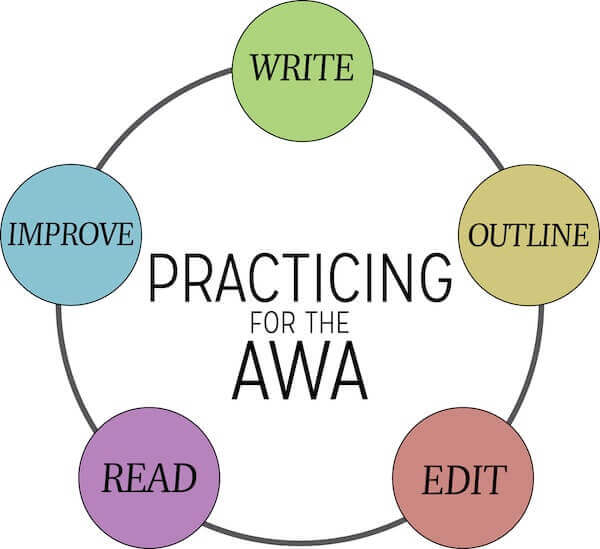GRE analytical writing is the most underrated sections of the GRE. If you ask prospective test takers to name the most difficult section in the GRE, students from engineering, math and physical science students would say “Verbal“, and others would say “Quant“. Perhaps, none would care about the GRE analytical writing section, and will end up getting a mediocre score in the writing section.
Why you should not ignore your GRE analytical writing score?
Not every test takers are ambitious, and ambitious test takers will not ignore this writing section. Because you can’t afford to do bad in this section if you are aiming for the top schools. A score 3 out of 6 in GRE analytical writing is equivalent to 18 percentile whereas a raw score of will shoot you up to 60 and 4.5 is equivalent to 82 percentile. Your score percentiles tell you how well you have performed with respect to other candidates. A 3 out of 6 seems OK score, but if you just look at the percentile then you will see how horrible is that.
Getting 4 or 5 out of 6 might not ensure you admission in top ranked schools, but it will add an extra advantage when there is a tie. For example, There is a tie between you and another candidate in terms of academic performance, GRE score, research experience etc. However, you scored 4.5 in and the other got 3.0. Then the admission committee will surely decide in your favor. Because you did exceptionally well more than 80% candidates, where the other person is way below average. So, if you want to go to top schools, where the competition is fierce, you should focus on scoring high in this section.
Professors look for good writers:
You will not be able to fathom this demand, unless you do not start your graduate studies. In most top US universities, Professors look for students who have good writing skills. This is because it is very critical to convincingly communicate your research ideas and works in proposals, reports, research papers and thesis. Apart from that, professors often require students to help them in submitting project report, manuscripts from the findings of ongoing project. Particularly, when you are planning to submit a paper, Professors expect that they have to put minimum effort to make the draft submission ready. Therefore, having a good writing skill is a must for every graduate students.

The GRE analytical writing section:
The GRE analytical section does not evaluate specific content knowledge. This section tests your ability to introduce a convincing thesis statement and then defend it. This section consists of two parts:
The issue task – evaluates your ability to develop and defend your own standpoint on an issue. You should agree or disagree on the given issue and support your stance.
The argument task -gauges your ability to comprehend and evaluate the given argument. Whether you agree or disagree with the presented claim, your job is to critically analyze the evidence presented to support the claim. Then pin down whether the evidence supports the argument, and write whether the claim is logically correct.
You will get 30 minutes to complete each of this task.

Organization of your writing:
There is no standard pattern or organization provided by ETS to follow. It is solely up to the writers how they want to organize their response in the real exam. However, it is always have a good idea to follow a particular organization of writing so that you do not miss any critical factors. Here, we are presenting a template for organizing your GRE analytical writing that we found from Ohio Wesleyan University Writing Center.
Issue Task:
While responding you should think about the issues from different perspectives, and support your own positions with reasons and examples (if possible). Follow is a sample organization that you can consider during practice writing:
Template:
- Paragraph 1 – Introduce both sides of the controversy. State your position.
- Paragraph 2 & 3 – Provide detailed reasoning for your support. Present at least three different reasons.
- Paragraph 4 – Summarize all the reasons, and affirm your stance with the best reason that you provided.
- Paragraph 5 – Provide a concluding statement based on your reasonings.
Argument Essay:
Your main job is to evaluate the logic presented in the argument and establish whether it make sense or not. Before you start practicing this part you should remember the following:
Premises – the facts the author use to defend his or her opinion.
Conclusion – the author’s final stance and recommendation for action.
Assumptions – underlying conditions, obviously unstated, that must be valid for the argument to sound reasonable. Usually assumptions bridge the stated premises and the conclusion.
Here is a common organization that you might use during writing.
Template:
- Paragraph 1 – Restate the argument.
- Paragraph 2 & 3 – Evaluate the underlying assumptions and premises. Discuss the link (or lack thereof) between the conclusion and evidence presented in support of it.
- Paragraph 4 – Identify the flaws in the reasoning of the argument and present it.
- Paragraph 5 – Offer ways to improve the argument by explicitly stating the missing assumptions.
Style guide:
Write in a explicit tone, avoid major errors in mechanics and grammar. Rather being verbose with GRE words, focus on content, logic and structure. Your writing should be coherent. Therefore, you must use proper transition words and phrases. For example use following words wisely to guide your readers:
Premise words: because, since, if, given that, in view of, in light of, assume
Conclusion words: so, therefore, thus, hence, showed that, clearly, then, consequently, as a result, conclude that
Contrasting words: on the other hand, on the contrary, nevertheless, conversely
To indicate something important: undoubtedly, clearly, certainly, indeed, as a matter of fact
Get acquainted with different topics:
ETS does not test your knowledge on different topics in the GRE analytical writing section. But issue writing from some specific topic can really knock you off. Therefore, it is wise to have some knowledge about different subjects outside our expertise. You can resort to sample writing tasks or some solutions provided by ETS and also other third party sources. Read at leas 20-30 essays from both issue task and argument writing. It will also help you to develop a thought process which will help you in writing. Also, read editorial columns, news articles etc. as much as you can.
Avoid using the first-person voice:
Never use the word ‘I’ in the introductory or concluding paragraphs. Only use first person pronouns in the body paragraphs if you are using a personal example or sharing a personal experience to reinforce your point. For example, do not write: “I do not agree with the statement that beauty is found not in the exceptional but in the commonplace”.
Practice, practice and practice:
Test takes put a lot of effort to prepare for both verbal and quant, but they barely put anytime into it. As a result, they exhibit poor performance in this section on the test day. You have to train your brain muscle in such a way so that you can finish both writing tasks withing the given time frame. If you never tried to write a complete writing task within 30 minutes at home, then on the exam day you will not be able to do it properly. You will rush to finish it as half of your time will be gone just for thinking. So practice hard. At least practice 10-15 essays from each section before your exam. Know the elements of a perfect writing that can bring you score 6. Put them before you so that you can follow what lacks in your effort.

To sum, scoring high over 80 percentile in GRE analytical writing section requires a lot of effort. Mostly, non-native writers usually have a very hard time to improve their writing. Here, we are assuming that you already have mastery on the fundamentals and grammars. If you not then we urge you to start with the basic. Improve your grammar, work on spelling errors and others, then practice specifically for the GRE analytical writing.
Disclaimer: No A.I. was used to generate any portion of this content.

